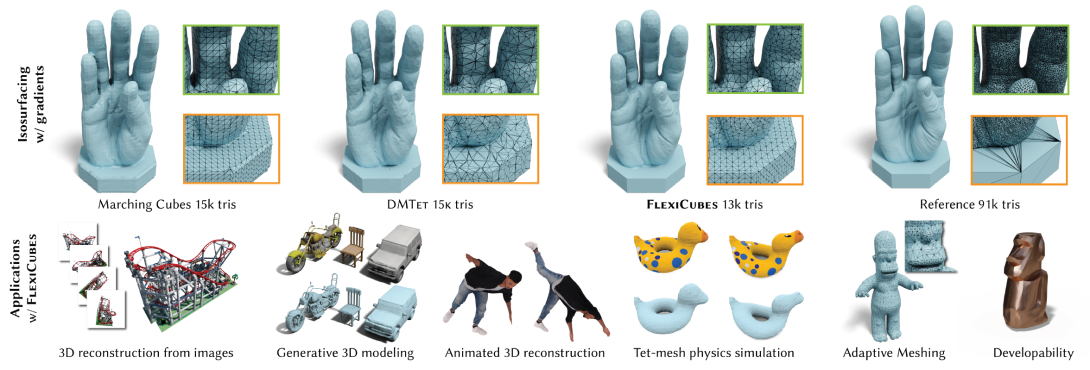Flexible Isosurface Extraction for Gradient-Based Mesh Optimization

This work considers gradient-based mesh optimization, where we iteratively optimize for a 3D surface mesh by representing it as the isosurface of a scalar field, an increasingly common paradigm in applications including photogrammetry, generative modeling, and inverse physics. Existing implementations adapt classic isosurface extraction algorithms like Marching Cubes or Dual Contouring; these techniques were designed to extract meshes from fixed, known fields, and in the optimization setting they lack the degrees of freedom to represent high-quality feature-preserving meshes, or suffer from numerical instabilities. We introduce FlexiCubes, an isosurface representation specifically designed for optimizing an unknown mesh with respect to geometric, visual, or even physical objectives. Our main insight is to introduce additional carefully-chosen parameters into the representation, which allow local flexible adjustments to the extracted mesh geometry and connectivity. These parameters are updated along with the underlying scalar field via automatic differentiation when optimizing for a downstream task. We base our extraction scheme on Dual Marching Cubes for improved topological properties, and present extensions to optionally generate tetrahedral and hierarchically-adaptive meshes. Extensive experiments validate FlexiCubes on both synthetic benchmarks and real-world applications, showing that it offers significant improvements in mesh quality and geometric fidelity.
Publication Date
Published in
External Links
Copyright
Copyright by the Association for Computing Machinery, Inc. Permission to make digital or hard copies of part or all of this work for personal or classroom use is granted without fee provided that copies are not made or distributed for profit or commercial advantage and that copies bear this notice and the full citation on the first page. Copyrights for components of this work owned by others than ACM must be honored. Abstracting with credit is permitted. To copy otherwise, to republish, to post on servers, or to redistribute to lists, requires prior specific permission and/or a fee. Request permissions from Publications Dept, ACM Inc., fax +1 (212) 869-0481, or permissions@acm.org. The definitive version of this paper can be found at ACM's Digital Library http://www.acm.org/dl/.
